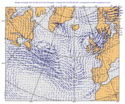uvwind
Computes the wind from spectral (shperical harmonics) divergence and vorticity GRIB fields.
Note
This function performs the same task as the Rotational or Divergent Wind icon in Metview’s user interface. It accepts its parameters as keyword arguments, described below.
- uvwind(**kwargs)
Computes the wind from spectral (spherical harmonics) divergence and vorticity GRIB fields.
- Parameters
data (
Fieldset) – Specifies the divergence and vorticity GRIB fields. Must be spectral (spherical harmonics) data.divergence_param (number, default: 155) – Specifies the ecCodes paramId that identifies the divergence in
data. New in Metview version 5.13.0.vorticity_param (number, default: 138) – Specifies the ecCodes paramId that identifies the vorticity in
data. New in Metview version 5.13.0.truncation (number, default: 216) – Specifies the triangular truncation to be applied to the spherical harmonics input data prior to conversion to lat/lon.
smoothing ({"yes", "no"}, default: "no") –
Specifies whether to apply spatial smoothing to the spherical harmonics prior to transformation to grid points. This operation is performed after the truncation specified in
truncation. The smoothing filter is of the form:\[exp^{(-\frac {n(n+1)}{fltc(fltc+1)})^{mfltexp}}\]where:
n: is the wavenumber
fltc, mfltexp: see below
This is roughly equivalent to a \(\nabla^{2 \times mfltexp}\) operator in grid point space.
fltc (number, default: 19.4) – Specifies the value of the parameter fltc to be used in the smoothing filter. Only available if
smoothingset to “yes”.mfltexp (number, default: 2) – Specifies the value of the parameter
mfltexpto be used in the smoothing filter. Only available ifsmoothingis set to “yes”. The default value is 2, roughly equivalent to a \(\nabla^{4}\) operator in grid point space.
- Return type

